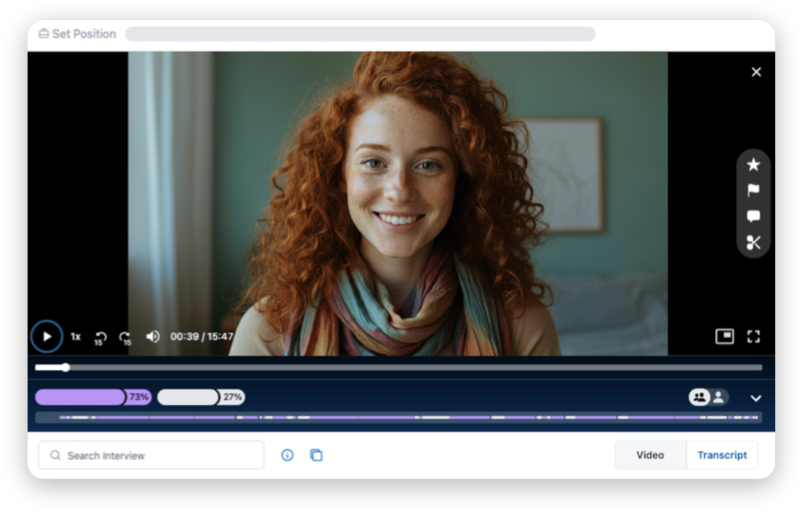In recent years, employers have placed greater emphasis on how well applicants handle the interview process. Showing that you can master common interview questions can offer you a significant advantage over other candidates. Each question is an opportunity to display your interviewing skills, work ethic, and overall fit for the work environment. By refining your approach to interviewing, you also show your potential employer that you are genuinely interested in the role and the organization’s future direction.
A typical job interview in the United States usually includes around six to eight questions aimed at assessing experience, personality, and career goals. However, for college or tech roles, the number of questions can range from five to 15, depending on how specialized the position is. Many companies also conduct multiple rounds of interviews and may schedule between 10 and 20 interviews per position to find the right candidate.
While the total number of questions may differ, some questions are used more than others, no matter the industry you are interviewing for. Importantly, the clarity and depth of your responses are more influential than the quantity of questions you answer. Well-organized, detailed answers tend to leave the strongest impression.
Additionally, about 70% of employers now review social media profiles as part of the screening process, indicating that your online presence and personal life can play a major role in shaping how they see you.
Overall, investing time to prepare for each question can significantly affect whether you advance in the hiring process.

Key Preparations
Preparing for a successful interview begins before you actually meet with the interviewer. To start, it is important to comprehensively review the job description and gain an understanding of the company’s culture. In doing so, you can identify which parts of your background, such as problem-solving, data analysis, or teamwork, best match the attributes the organization values most.
Many organizations publish relevant details on their websites, showcasing their values or the range of projects they handle. Referencing this information during your interview demonstrates that you have done your research and care about what the company represents.
Expectations about a fair salary can be another source of worry, so exploring the average pay range in your field can help you give a well-informed answer if compensation comes up during the interview. This kind of preparation often boosts your confidence and shows that you have practical insights about industry standards.
Reflecting on past roles also makes it easier to craft authentic answers with convincing examples. If you have solved significant challenges by exhibiting your skills in the past, these experiences can provide strong evidence of your capabilities.
Finally, self-awareness is just as essential. Knowing your strengths and weaknesses allows you to speak about your abilities truthfully. For instance, if public speaking at your current job has been a challenge, you can outline the steps you have taken to improve. This level of honesty shows employers that you value ongoing growth. By taking these measures, you greatly improve your chances of performing well and reduce the likelihood of being surprised by any unexpected interview questions.

The 10 Common Interview Questions
Question 1: Tell Me About Yourself
“Tell me about yourself” is asked in approximately 93% of interviews, making it one of the most common questions asked during the interview process. Preparing a clear and concise answer to this question beforehand can be helpful. Keeping your response focused on your most important achievements and qualities ensures you capture the interviewer’s attention. Conclude your answer by showing how these elements would prepare you for success in the role you want.
Pro tip: Consider this moment an opportunity to outline your career path and highlight a few skills that make you stand out. You could mention a recent experience where you utilized applicable abilities to improve a situation or benefit your team.
Question 2: Why Are You Interested in This Job?
Many employers want to see whether you truly understand the position and the company. Discuss the specific things you have learned from the company’s website, like its collaborative approach or the values that guide its work environment. If you’re seeking a new job in an innovative field, point out which aspects of the role excite you and why you believe you would be a strong fit.
Pro tip: Emphasize the growth opportunities you see for yourself, and explain how your career goals match the company’s goals.
Question 3: What Are Your Strengths?
When asked about your strengths, it is important to offer real examples to back up your points. If you excel at problem-solving, describe a situation where you tackled a challenge by breaking it into smaller tasks. If communication is among your strong points, share how you led a presentation or guided a team through a high-pressure deadline.
Pro tip: Using measurable results, such as boosting revenue or customer satisfaction, can make your answer more compelling.
Question 4: What Is Your Greatest Weakness?
This question can feel uncomfortable, but it offers you a chance to demonstrate self-awareness and honesty. Admitting a true weakness, such as being nervous about speaking in public, can help if you explain the steps you are taking to improve. You might mention a course you took or advice you received from a mentor. Employers often admire individuals who take the initiative to grow.
Pro tip: Choose a genuine weakness that is not essential to your key responsibilities. Instead, focus on areas where improvement is possible and show your proactive approach to professional growth.
Question 5: Why Did You Leave Your Last Job?
When explaining why you left your previous position, keep your tone positive. Employers want to learn if you departed for reasons related to professional or personal growth or other valid motivations. You can say you were searching for a corporate culture that better fits your values, a new set of responsibilities, or a role with fresh challenges.
Pro tip: Even if you encountered problems at your previous workplace, highlight what you learned and how you plan to use that knowledge in your new role.

Question 6: Describe a Challenge You Faced and How You Handled It
Many interviews involve questions that test your problem-solving ability and adaptability. You might describe how you used your ability to analyze a situation to get to the root of the problem or employed a scientific approach to make a process more efficient. Emphasizing a positive outcome demonstrates that you can navigate and learn from obstacles.
Pro tip: In your answer, detail several clear steps you took to tackle a difficult situation. By doing this, you can show your thought process and how you approach problems.
Question 7: Where Do You See Yourself in Five Years?
Employers use this question to find out whether your long-term plans align with what the company can offer. You should talk about hopes for gaining new skills, stepping into a managerial role, or enhancing your expertise in a specialized area.
Pro tip: Linking your plans to the company’s goals shows that you intend to contribute in meaningful ways and stay committed over time.
Question 8: Tell Me About a Time You Demonstrated Leadership Skills
Leadership is a quality that many organizations value and prioritize when considering candidates. One effective strategy is to describe a real scenario from a recent job or previous roles where you led a group, resolved conflicts, or boosted team motivation. Provide concrete examples of improvements, such as higher morale or a notable increase in productivity. Clear and specific outcomes make your story more convincing.
Pro tip: Tailor your leadership example to align with the company’s values and industry. Frame your answer to demonstrate how your leadership approach would fit into their corporate structure.
Question 9: How Do You Handle Conflict at Work?
Employers look for people who can handle conflicts politely and effectively. Think of an occasion when you had to resolve a clash with coworkers or other stakeholders. Discuss how you used your communication skills to hear different views and negotiate a fair compromise. Emphasize that the result was positive for both the team and the company, showing that you helped create a positive work environment.
Pro tip: When discussing conflict resolution, focus on your solution-orientated mindset rather than just the disagreement itself.
Question 10: What Are Your Salary Expectations?
Talking about money can be awkward, but salary questions are common in many job interviews. If you have researched typical industry salaries, you can propose a salary range that fits your experience and responsibilities. This reflects your knowledge of the industry as a whole.
Pro tip: Let the interviewer know you are open to negotiation, but also assert that you are looking for fair compensation that matches your background and the demands of the role.

Advanced Interview Strategies
Learning about these questions is only part of getting ready for the interview. The best way to gain confidence is to prepare thoroughly before the meeting. One effective approach is to conduct a practice interview in conditions that closely resemble what you might encounter. You could get a colleague or friend to provide role-playing scenarios posing relevant and popular questions like those listed above. By recording these sessions, you can review and refine your speaking style, tone, and pacing.
Expert guidance can also be very helpful. At Keller, we recommend drawing on genuine anecdotes from your previous job so that your answers feel grounded in actual work experiences. It is also a good idea to give anyone who assists in your preparation a heads up, letting them know the specific position you are aiming for and the company’s broader goals.
Paying special attention to your public speaking skills is as important as refining your interview skills. Body language is critical; you should focus on consistent eye contact and clear articulation. These small improvements can make a lasting impression.
Finally, ensure your cover letter echoes the points you plan to discuss in the interview. Recruiters look for alignment across your entire application, and when your written materials match your spoken responses, you appear organized and professional.
Common Interview Pitfalls
By steering clear of the following pitfalls, you can greatly improve your likelihood of making a positive, lasting impression and advancing in the hiring process. Everything from arriving punctually to sending a timely follow-up note helps illustrate your potential as a diligent and respectful addition to the team.
First Impressions
Unprofessional behaviour can quickly leave a poor impression. Arriving late is a prime example, although showing up far too early may also create an awkward situation. Dressing in a manner that does not meet the general standards of corporate attire can cause the interviewer to question your judgment. Other bad habits that leave a lasting impression include checking your phone during the conversation, which reflects poor etiquette. Meanwhile, appearing disinterested, whether by slouching, chewing gum, or simply seeming disengaged, can diminish your credibility.
Communication Errors
Communication errors are another significant stumbling block. Candidates who speak excessively or wander away from the topic may weaken the impact of what they have to say. Similarly, criticizing past employers or providing vague, clichéd answers does little to show genuine strengths. The interviewer cannot accurately gauge an applicant’s true capabilities without concrete details.
Overselling Yourself
Some job seekers may want to prove that they are the best candidate for the job. They may appear arrogant or oversell their achievements to reach that goal. They might avoid mentioning their weaknesses, which could raise more red flags. This approach often backfires as employers can quickly tell that the candidate is not being genuine.
Pitfalls During the Interview Process
There are, moreover, pitfalls in the interview process itself. If you fail to inquire about the position or the company, it can leave the impression that you are not especially invested. Prematurely bringing up salary or benefits might make it look like compensation is your main concern. Failing to follow up post-interview can create doubts about your interest in the role. Being too casual or sharing overly personal anecdotes can also derail a professional discussion.

Mastering interview questions involves more than memorizing scripted answers. It calls for genuine interest in the corporate culture, clear examples of your problem-solving skills, and authentic responses that allow your character to shine.
Whether you are transitioning to a new job in computer science, digital marketing, or another field, these common interview questions are often asked. By paying close attention to them, you can increase your odds of successfully answering them during an interview. Be well-prepared, stay confident, and show why you are a strong asset to the company.

Frequently Asked Questions
How can I research a company effectively before an interview?
When preparing for your next interview, the most effective way to research an organization is to focus on the company culture and work environment. Pay particular attention to the organization’s history, key milestones, and product line to understand how it grew and what sets it apart. It can also be helpful to learn about their biggest competitors and industry trends so you can speak to broader market conditions when necessary.
Should I follow up after an interview, and if so, how?
Following up after an interview is a professional way to reaffirm your interest, express gratitude, and stay on the hiring manager’s radar. Begin with a thank-you email within 24 hours, referencing key moments from your conversation and showing continued enthusiasm for the role. If you receive no update after the timeframe discussed, send a polite follow-up email requesting an application status update. Keep your tone polite, restate your excitement, and offer any additional details that could strengthen your case.
What if I’m interviewing for a role in a completely different industry or career path?
When switching industries, you must make a strong case for why you are a good fit, even if you don’t have as much experience as other applicants. In the interview, you will need to emphasize transferable skills from previous roles and how they could be relevant to the potential employer’s industry. If asked about your career change, be positive about how this decision aligns with your goals. Highlight how your current experience has equipped you with unique capabilities that can benefit the new role.










